No dejaremos que el español desaparezca en Dajla
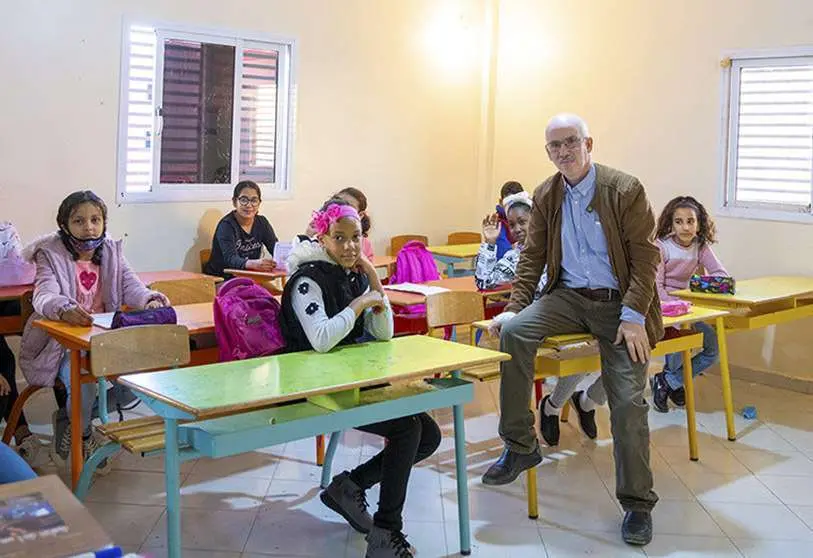
España estuvo en Dajla durante casi un siglo, de 1884 a 1975, pero son pocas las huellas que quedan de un legado español que siempre se trató de minimizar, tanto por parte marroquí que ambicionaba la anexión del territorio con la salida de los españoles tras la Marcha Verde, como por los españoles que reconocían que los acuerdos firmados deberían haberse hecho de otra manera, hasta el punto de evitar la guerra que mantuvo el Frente Polisario contra Marruecos hasta el alto el fuego de 1991.
Pero más allá de las circunstancias políticas e históricas, cuando te encuentras en Dajla espera encontrar algún patrimonio cultural, social o militar. La realidad se reduce al faro, a un viejo cuartel militar, a una plaza, a una biblioteca y a una academia de idiomas, la Academia Unamuno, dirigida por un intelectual, Brahim Hameyada, que comenta la determinación de un grupo de saharauis que no están dispuestos a que el español desaparezca. En la academia, dan clase de español dos grupo de 15 y 17 alumnos cada uno. Han conseguido el reconocimiento del Instituto Cervantes y sus diplomas son homologables.
Spain was in Dakhla for almost a century, from 1884 to 1975, but few traces remain of a Spanish legacy that has always been minimised, both by the Moroccans, who wanted to annex the territory with the departure of the Spanish after the Green March, and by the Spaniards, who recognised that the agreements signed should have been done differently, to the point of avoiding the war that the Polisario Front maintained against Morocco until the ceasefire of 1991.
But beyond the political and historical circumstances, when you find yourself in Dakhla you expect to find some cultural, social or military heritage. The reality is reduced to the lighthouse, an old military barracks, a square, a library and a language academy, the Academia Unamuno, run by an intellectual, Brahim Hameyada, who comments on the determination of a group of Sahrawis who are not willing to see Spanish disappear. At the academy, two groups of 15 and 17 students each teach Spanish. They and their diplomas have been recognised by the Instituto Cervantes.
When did the idea of founding the Academia Unamuno come up and why?
The idea came up with several friends in their forties and fifties, who are from a generation of Saharawis who were once Spanish. First of all, before this academy, we founded an association called Asociación Cultural Río de Oro. Then we started trying to create a group of people to try to recover the Spanish language and part of the Spanish culture that was disappearing.
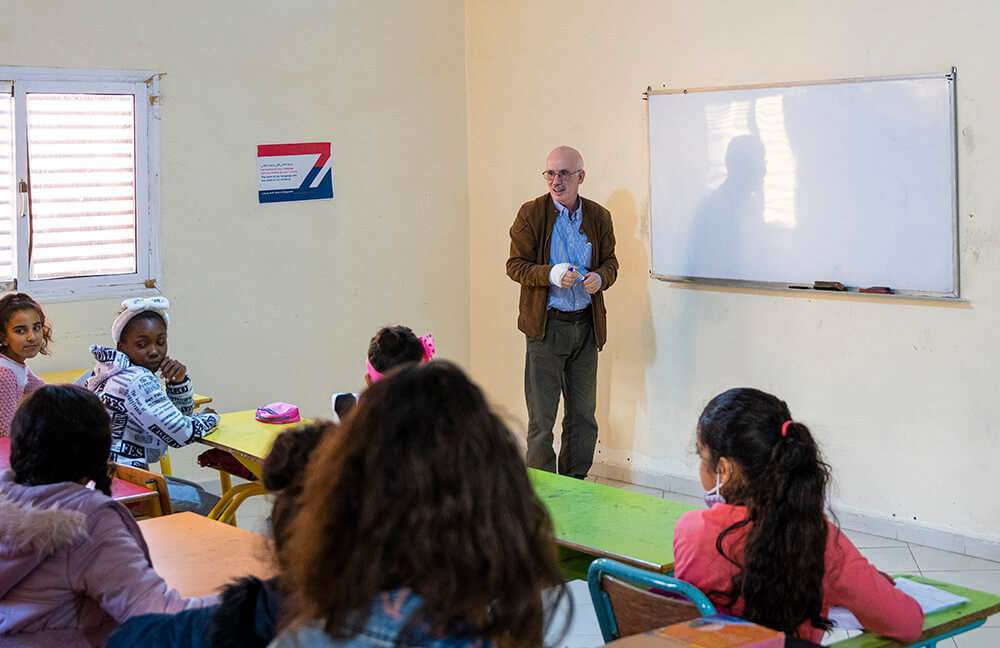
What kind of activities does the association develop?
A series of activities to spread Spanish as a language that was being lost and that historically belonged to the region. We did activities such as Spanish classes for interested people, we organised conferences on the importance of Spanish. Within all these activities and within the framework of the strategy that we have carried out, we came to the conclusion that apart from the Association we had to create an academy.
Why the name Unamuno?
I personally named it after Unamuno out of admiration for this philosopher, a great writer who influenced me during my studies when I was young. He was one of the authors who most attracted my attention.
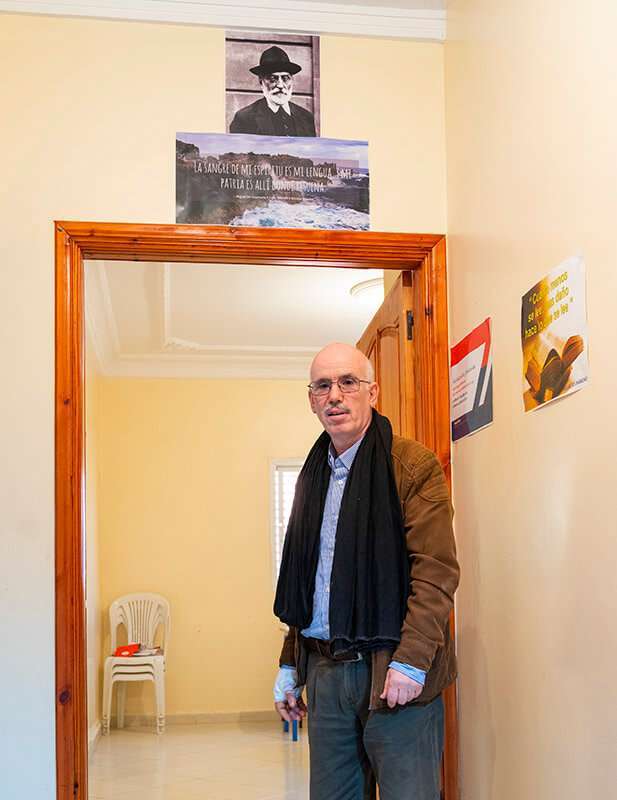
Did you obtain recognition for the academy from the Cervantes Institute?
From there, the language academy was founded, mainly for Spanish. Two years after it was founded, I managed to get it recognised as an accredited centre of the Instituto Cervantes, where Spanish exams at all levels can be taken.
Are your diplomas recognised?
They are diplomas that people need for many things, for example to obtain Spanish nationality because one of the requirements is to have at least an A2. Therefore, here we have a centre that is already a forum for the promotion of Spanish.
Do you do more activities at the academy than just classes?
We have not only limited ourselves to the language but we also do cultural activities such as readings, a diploma award ceremony and a series of other activities. We do it with the limited means we have, but in spite of everything we really enjoy doing this work and I believe that in the end we will reach our goal, which is to try to recover Spanish, a language that already existed, that is part of this region and that we will not let it be lost.
How many students are learning Spanish?
During these five years, around 5,000 have passed. The first DELE exam diplomas were handed out in 2016.
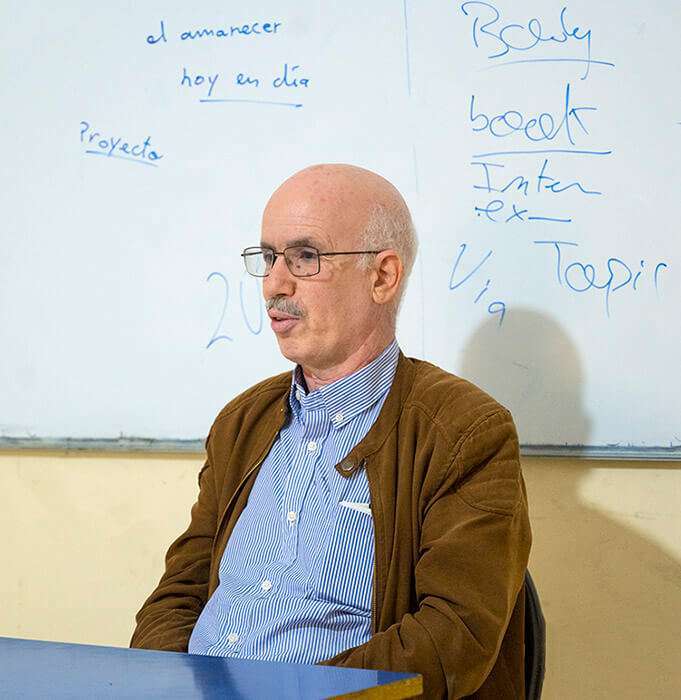
And that's when you were given the licence?
We received it about four or five months before, but the first diplomas were delivered in 2016.
Do you have any support from the Spanish government or the Moroccan government?
Apart from our own efforts, there is some minimal support from the Regional Council. Not much, but it is aid, after all. The rest is aid from the Association itself, from the tuition fees of the students and some means from some businessmen who are encouraged to help in this type of cultural activities, but well, we always trust in our own strength more than in the help of others.
Have you never lost your enthusiasm?
We will continue with this academy and with the Association so that Spanish is not lost.
What would you like to ask the Spanish Ministry of Education?
Both the Ministry and the Spanish Government are already aware of the situation of Spanish here and, through the academy, I personally met with several media, such as the EFE agency, when we awarded the first diplomas in 2016.
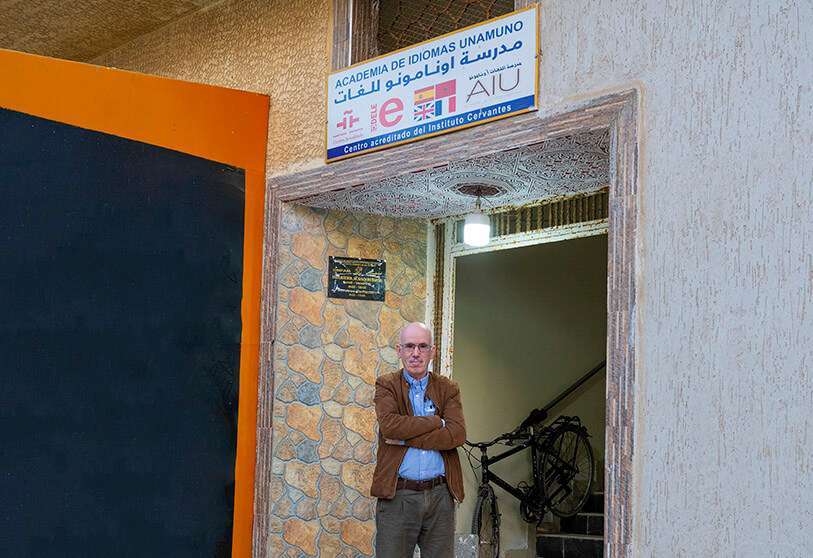
Is your situation known?
Through the media there are many parties, both governmental and non-governmental, who are aware that there are voices here, let's say SOS, so that Spanish is not lost.
Have you had any response to your SOS?
Unfortunately we haven't had a response so far, but that doesn't stop us from going ahead.
What languages do you study here?
Here we study Spanish first and foremost, but also French and English. We teach the languages that are in great demand here. French because it is a second language in Morocco, English because it is a world language and Spanish because we consider it a mother tongue and also because it is the second most spoken language in the world after English.
Are the students aware of the importance of learning Spanish?
That is what we are explaining to many students who are unaware of these facts.
Do you want to send a message to public opinion in Spain?
I appeal to the Spanish government and to the organisations that can help to ensure that the Spanish language is maintained in the places where it is being lost and spread to other parts of the world. Above all, here if possible, we ask them to give us a hand.









